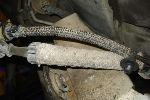Looking around, it seems a 1-horse trailer is going to be at least 2000 lbs empty. The nice ones I saw (Equispirit?) were 2800, but there were really 2-horse units with 1 bay designed as a tack/dressing area. I don't know horses, but these units said that the typical loaded trailer (1 horse plus equipment) would be around 4500. Even if you had a smaller/lighter trailer, and put more equipment in the Explorer, that simply reduces your available tow rating.
So, figuring on 4000+ lbs of trailer, horse, and equipment, You should be sure you have the 5500 lb tow limit on that Explorer. I suspect you needed the 4.10 gearing back then to get that rating.
Speaking of rating, have you looked at your owners manual to determine what your actual tow rating is with the 3.73 axles?










